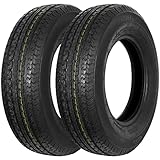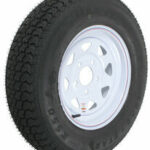There are a few things to consider when deciding if you should get 14 vs 15 trailer tires. The main difference between the two is the size, with 14 being slightly smaller than 15. This can affect the load capacity of your trailer and how well it handles on the road.
If you’re not sure which size to get, it’s best to consult with a professional or look at your owner’s manual.
There’s a lot to consider when deciding whether to buy 14″ or 15″ trailer tires. Here are some things to keep in mind:
-15″ tires typically have a higher load capacity and can better handle heavy loads.
-14″ tires may be a better option if you’re looking for a smoother ride, as they tend to have softer sidewalls.
-15″ tires generally cost more than 14″ tires.
-If you’re not sure which size tire is right for your needs, it’s always best to consult with an expert before making a purchase.
You May Like – 14 Trailer Tires
Are Larger Trailer Tires Better?
There are pros and cons to having larger trailer tires. The main advantage is that they provide more stability and traction, which is especially important when towing a heavy load. They also last longer and can handle more wear and tear.
On the downside, they can be more expensive and may require special rims. You’ll also need to take into account the increased width of your trailer when choosing larger tires.
How Long Should Trailer Tires Be?
There is no definitive answer to how long trailer tires should be used. Depending on the type of trailer, its usage and load capacity, as well as the conditions it is typically operated in, tire life can vary greatly.
The best way to determine when to replace your trailer’s tires is to have them regularly inspected by a qualified tire professional.
They will be able to check for tread wear, sidewall cracking and other signs of deterioration that can shorten tire life.
What is the Most Common Trailer Tire Size?
There are a few different types of trailer tires, but the most common size is ST205/75R14. This size is often used on smaller trailers, such as pop-up campers and utility trailers. The “ST” in the tire size stands for “special trailer,” which means that it’s designed specifically for use on trailers.
The number 205 refers to the width of the tire in millimeters, while the 75 indicates that the sidewall height is 75% of the width. The “R” denotes that the tire is radial, and 14 is the diameter of the wheel in inches.
You May Also Like – 15 Trailer Tires
15 Trailer Tires
15″ trailer tires are a common size for small to midsize trailers. They offer a good balance of load capacity and maneuverability, making them a popular choice for many applications. When shopping for 15″ trailer tires, it’s important to keep in mind the weight of your trailer and the type of terrain you’ll be traveling on.
Here are some things to keep in mind when choosing the right 15″ tire for your needs: The weight of your trailer: Heavier trailers will need tires with a higher load rating in order to avoid premature wear or failure.
The type of terrain you’ll be traveling on: If you’ll be mostly on paved roads, then a standard passenger or light truck tire will suffice. However, if you’ll be venturing off-road or onto rougher surfaces, then you’ll need a tire with deeper tread and possibly even some additional features like mud flaps or reinforced sidewalls.
Your budget: Tires can range in price from around $50 each up to several hundred dollars each, so it’s important to know how much you’re willing to spend before beginning your search.
Once you’ve considered all of these factors, you should have a better idea of what kind of 15″ trailer tire is right for your needs. Be sure to consult with an expert if you’re still unsure – they can help point you in the right direction and ensure that you get the perfect set of tires for your application.
Boat Trailer Tires
Boat trailer tires are an important part of towing your boat. They provide the necessary traction and support for your boat and trailer while you are driving. There are a few things to consider when choosing the right tires for your boat trailer.
The first thing to consider is the size of the tire. Boat trailers come in different sizes and so do tires. You will need to make sure that the tires you choose are the correct size for your particular trailer.
The second thing to consider is the load capacity of the tire. This is important because you want to make sure that the tires can handle the weight of your boat and trailer combination. The third thing to consider is the type of terrain you will be driving on with your boat trailer.
If you plan on mostly driving on paved roads, then you will want to choose tires that have a good tread pattern for traction on pavement. If you plan on driving off-road or in muddy conditions, then you will want tires with a more aggressive tread pattern that can handle those conditions better.
Once you have considered all of these factors, then you can start looking at specific brands and models of boat trailer tires. There are many different brands and models available, so it is important to do some research before making a purchase.
You can read online reviews from other boaters or talk to someone at your local marina or boat dealership who can give you some advice on what type of tire would be best for your needs.
13 Inch Trailer Tires
If you’re shopping for 13 inch trailer tires, you have a few different options. You can choose from bias ply or radial tires, and you can also select from a variety of load ranges. Here’s a closer look at each of these choices to help you select the right tires for your trailer.
Bias ply trailer tires are designed with crisscrossing fabric cords that run diagonally across the tire. These tires typically offer a smooth ride and good handling, making them a good choice for smaller trailers. Radial trailer tires feature steel belts that run around the circumference of the tire.
These tires provide better fuel economy and resistance to tread wear, making them ideal for larger trailers.
There are three main load ranges for trailer tires: C (or standard), D (or intermediate), and E (or extra). The load range indicates how much weight the tire can safely carry when properly inflated.
Most 13 inch trailer tires will be rated for either C or D load range; however, if you have a very large or heavy-duty trailer, you may need to opt for an E-rated tire.
Best Trailer Tires
If you’re in the market for new trailer tires, there are a few things you’ll want to keep in mind. First, consider the load capacity of the tires. You’ll want to make sure they can handle the weight of your trailer and its contents.
Secondly, think about the terrain on which you’ll be using your trailer. If you’re planning on doing any off-roading, you’ll need tires that can handle rough terrain. Finally, take into account the weather conditions in which you’ll be using your trailer.
If you live in an area with lots of snow and ice, make sure to get tires that can provide good traction in those conditions.
Once you’ve considered all of these factors, it’s time to start shopping around for the best trailer tires for your needs. There are a few brands that we recommend highly here at Trailer Tires HQ.
Goodyear is one of our top picks – they make high-quality tires that are built to last. Another great option is Michelin – their trailers tires are known for being both durable and reliable. Whichever brand you ultimately choose, just make sure to do your research and buy from a reputable dealer.
Can I Replace the 14 Inch Wheels With 15 Inch on Travel Trailer?
Replacing the wheels on a travel trailer is a simple process that can be done in a matter of minutes. The first thing you will need to do is purchase the new wheels. 15 inch wheels are a popular choice for many reasons.
They are larger than 14 inch wheels, which gives them better stability on the road. They also have a higher load rating, which means they can handle more weight.
Once you have the new wheels, you will need to remove the old ones.
This is simply a matter of unscrewing the lug nuts and then pulling the wheel off. Be sure to keep track of which lug nuts go on which wheel so you can put them back on in the same order.
Once all four old wheels are removed, it’s time to install the new ones.
Again, start by screwing on the lug nuts (in the correct order!) and then lowering the trailer onto its new set of wheels. That’s all there is to it!
Conclusion
There are a few factors to consider when deciding whether to upgrade from 14″ to 15″ trailer tires. One is the increased load capacity that comes with the larger tire size. Another is the improved handling and stability that 15″ tires provide. And finally, 15″ tires simply look better than 14″ ones!
Ultimately, the decision comes down to personal preference and what you’re looking for in a trailer tire.


















